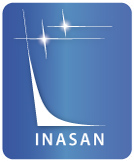
APSG 2015 RESOLUTION
27 AUGUST 2015
#1:Recognizing with great sadness the passing of Dr. Suriya Tatevian on July 16, 2015 while expending her usual extraordinary efforts to organize and promote the meetings of the Asia-Pacific Space Geodynamics Project. We, the delegates to the APSG 2015, dedicate the products and deliberations of this APSG 2015 meeting in memory of our beloved Dr. Suriya Tatevian, Moscow Institute of Astronomy, RAS. #2 (APSG Resolution on the Global Geodetic Observing System): The Asia-Pacific Space Geodynamics Project,
noting
• the invaluable contribution that observing stations in the Asia-Pacific region make to global geodetic observing programs,
• the importance of global geodetic reference frames like ITRF2008 to investigations of geodynamic processes in the Asia-Pacific region,
• the initiative of the Geodesy Section of the Russian National Geophysical Committee for the common regional terrestrial reference frame (TRF) creation,
• the value of the GGOS project for the development globally distributed geodetic observatories with collocated advanced VLBI, SLR, GNSS, and DORIS instruments such as those installed by Russian Academy of Sciences and being developed by the Federal Agency of Scientific Organizations (FASO) at its QUASAR network sites and by the Chinese Academy of Sciences (CAS) at its geodetic observatories.
recommends
• to enhance cooperation and exchange with IAG’s Global Geodetic Observing System, and
• to encourage the direct bilateral cooperation between Russian and Chinese organizations in the exchange of their geodetic data. #3: Recognizing the importance of a real time GNSS data exchange and its application to the mitigation of natural disasters and further understanding that the benefits of real time data sharing will contribute to the improvement of GNSS systems including GLONASS, Beidou, GPS, Galileo, QZSS, and IRNSS through a more extensive ground based observational network and a broader scientific and societal user base;
And following the United Nations General Assembly in its resolution of February 26, 2015 on A Global Geodetic Reference Frame for Sustainable Development (http://www.un.org/ga/search/view_doc.asp?symbol=A/69/L.53,
http://us2.campaign-archive2.com/?u=33cf89da7ade3a85156c5eda4&id=b2035e2f78 );
The APSG recommends that member organizations join and contribute to the Global Geodetic Observing System’s (GGOS/IGS) real time service. #4: Recognizing the July 2015 International Union of Geodesy and Geophysics recommendation for the development of a GNSS Augmentation to the Tsunami Early Warning System for the Indo-Pacific region (http://www.iugg.org/resolutions/IUGGResolutions2015.pdf)and that the real time system can provide effective warning for large mega-thrust earthquakes; The APSG recommends that its member organizations support and encourage their responsible national agencies for disaster mitigation to also participate in an initial workshop in 2016 to define the requirements and next steps to establish a GNSS Augmentation to the Tsunami Early Warning System based upon the principles of shared resources and with the goal of establishing designs, agreements, and support to encourage cooperative improvements to infrastructure, algorithms, and data sharing. #5: Recognizing the need of robust GNSS positioned tide gauge systems to separate vertical land motion and sea-level change at the regional scale for societal applications such as mitigation and alleviation of coastal vulnerability in the world’s deltaic region and in particular in the Asian-Pacific area;
The APSG recommends that its member national organizations support and encourage strategic building of geodetic quality GNSS stations collocated with well-surveyed long-term tide gauges in the Asian-Pacific region. #6: Recognizing the demonstrated importance of satellite measurements of the Earth’s gravity field in furthering our understanding of the transport of mass within the Earth’s system in response to the climatic and tectonic forces
and further recognizing the significant progress reported by US, China, Russian, European and other nation’s scientists in the development of new gravity mission and the data analysis of the existing GRACE mission;
The APSG recommends that its members from various national scientific organizations support and welcome all the future GRACE-type gravity missions.
The APSG encourages member organizations in the development of gravity missions and data analysis while also urging and encouraging our member organizations to adopt a policy of open data availability for substantial and continued success in the analysis of the gravity data for environmental and geohazard analysis.

|

